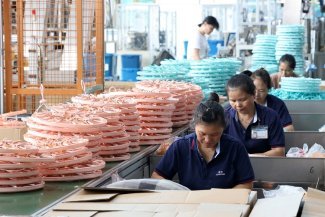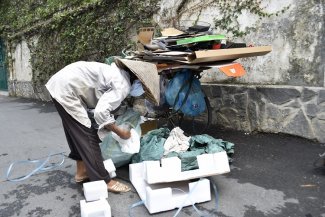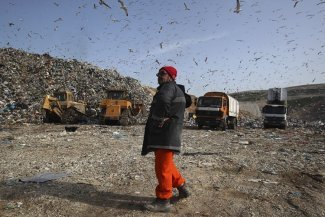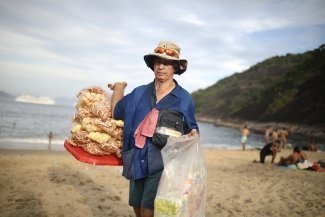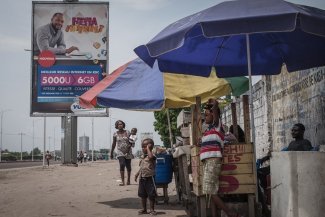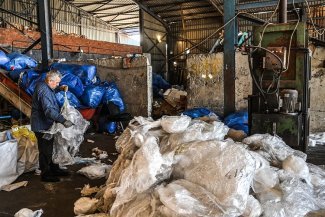Plastic recycling plant in Kartepe, Kocaelion, Turkey.
‘Waste colonialism’: this is how activists and scientists characterise the export of rubbish from the European Union to its main buyer Turkey. This waste, which has serious consequences for human health and the environment, has proven difficult to sweep under the rug as its journey is a round trip: Turkey contributes to 16 per cent of the plastic pollution in the Eastern Mediterranean. Toxic substances from this waste end up in the food that is consumed inside and outside of Turkey.
While plastic represents the primary environmental and health hazard amongst the European waste that Turkey receives, it accounts for only 4 per cent – or 400,000 tonnes – of a total of 14 million tonnes of waste. The rest is made up of scrap metal (13 million tonnes) and paper (400,000 tonnes). Turkey, it should be noted, is also one of the world’s leading producers of plastic.
Turkey’s geographical proximity to Europe and its common membership within the Organisation for Economic Co-operation and Development (OECD) combined with its lax environmental policies have led the country to become the EU’s dumping ground since China banned plastics imports in 2018.
In 2021, Europe exported 33 million tonnes of waste, almost half of which went to Turkey, twice as much as before the Chinese ban.
This is a problem of global proportions: the world’s most developed countries – including the United States, Canada, Japan, the United Kingdom and the EU countries, all of which have strict environmental policies themselves – send their waste to emerging economies such as Turkey, Malaysia, Indonesia and Vietnam. The planet is becoming inundated with plastic waste, one of the main obstacles to curbing climate change.
In addition to plastic from the EU, Turkey received 122,898 tonnes of plastic waste from the UK, accounting for 27 per cent of UK plastic exports. At the same time, Turkey is the second largest manufacturer of plastics in Europe (behind only Germany) and the seventh largest in the world, producing around 10 million tonnes per year, according to 2021 data from PAGEV, the plastics sectoral organisation in Turkey.
Research by the UK NGO Environmental Investigation Agency revealed that Turkey generated 3.9 million tonnes of domestic plastic waste in 2021 while importing a total of 682,208 tonnes.
“The fact that Turkey continues to buy plastic waste from the EU while producing so much plastic itself is due to the growth of the recycling sector. But there’s also another problem here. Research shows that only nine per cent of the plastic produced to date can be recycled,” Gözde Sevinç, project development officer at Greenpeace Turkey, tells Equal Times. The remaining 90 per cent ends up in illegal landfills on beaches, in rivers, in fields and, consequently, in vegetables and seafood.
“The EU sends the worst of its waste to Turkey, without any concern for environmental factors or working conditions [of recycling workers]. This is what we call waste colonialism,” says Kıvanç Eliaçık, head of the international relations for DISK, the Confederation of Revolutionary Trade Unions of Turkey.
Dangerous and uncontrolled recycling
After arriving at the ports of Istanbul and Mersin, containers of European waste are distributed to recycling plants across Turkey. Some 2,000 of them, or one tenth of the country’s licensed recycling plants, are concentrated in the southern city of Adana.
In a 2021 report entitled It’s As If They’re Poisoning Us, Human Rights Watch (HRW) sounded the alarm about the effects of European plastic waste in Turkey. The report, which features testimonies, chemical analyses and medical reports from workers in processing plants and nearby residents, details how many of these workers suffer from asthma and other respiratory illnesses.
“Most workers in the sector are unregistered and lack social security. Trade unions are fighting for limited working hours, health and safety standards, and decent wages,” explains Eliaçık. According to Syrian and Afghan refugees who work in processing plants, serious accidents and even deaths have occurred.
Both the HRW report and a Greenpeace report published the following year detail how the recycling process releases a range of toxic chemicals that can cause endocrine and respiratory diseases such as asthma, as well as cancer and even genetic mutations. Moreover, these toxins, mostly dioxins, heavy metals and polymers, end up in the fruit and vegetables produced in the Çukurova valley, one of the most fertile valleys in the world, which are then distributed for domestic consumption and export.
In the wake of public outcry, the government in Ankara banned the import of European waste in 2021. However, under pressure from the booming recycling industry, it resumed imports two months later.
Why does Turkey import waste from the EU?
Waste sorting is not a part of municipal waste collection in Turkey. Instead, it is performed by an army of half a million street waste collectors, the bottom rung on the ladder of Turkish recycling. Waste collectors traditionally came from cities like Niğde or Hakkari. Now Syrian and Afghan refugees fleeing conflict in their home countries fight for business. They are the poorest of the poor, working from sunrise to sunset and selling what they collect to recycling plants for as little as €0.10 to €0.20 per kilo. The best profits end up in the pockets of the middlemen and the processors.
This is why the plants prefer European plastic waste, which in theory arrives already clean and sorted, and thus generates higher yields. Even so, much of the European plastic ends up in illegal landfills near the processing plants, where French cheese wrappers and German potato chip bags can easily be spotted.
In a 2021 academic report, biologist Sedat Gündoğdu of Çukurova University points out that European and local plastic waste are similarly priced (about €0.20): “The increase in plastic waste imports in recent years raises suspicions about how much recycling companies charge for plastic imports.” Speaking to Equal Times, Gündoğdu claims that European exporters falsify export documentation, as waste exports are often not sorted as declared. He believes there is an undeclared profit – or a sale below the declared price – of “between €50 and €100 per tonne, because the exporting companies, specifically the European ones, send containers with material that is impossible to recycle in exchange for that money. We call this illegal trade, mislabelling and fraudulent documentation”.
According to Gündoğdu, only 1 per cent of national plastic production is recycled, while the rest ends up in the sea. Turkey’s southern coast, famous for its turquoise waters, is the most polluted in the Mediterranean, with 3 to 4 times more microparticles than in the rest of the sea.
As Eliaçık of DISK goes on to explain, the economic crisis is another reason why the government is looking the other way: “Turkey is swallowing all kinds of bitter medicines to revive its economy. Their prescriptions include courting multinationals. They say ’invest here, the labour is cheap, there are no trade unions and the working hours are long,’ and the end result is rubbish dumping. This is how the government is trying to overcome its economic, social and political crisis.”
Small steps in the right direction
While rubbish piled up on Turkey’s once beautiful beaches in the last days of summer, Turkish President Recep Tayyip Erdoğan signed the Global Zero Waste Declaration of Goodwill at this year’s UN General Assembly on 18 September, aiming to achieve “a cleaner, greener and more liveable world for future generations”. Sources consulted for this report have not commented on the announcement. According to environmental groups, while the aims of the Turkish legislation are correct on paper, more specific laws and implementation are needed.
DISK demands that Brussels include articles guaranteeing social and labour rights in the customs union and free trade agreements, in line with the priorities of European trade unions for Turkey’s possible accession to the Union.
The Turkish Green Party is calling for both heavy investment in recycling and waste management, as well as in in civil education, as the population itself lacks a culture of respect for the environment. For its part, Greenpeace demands that Ankara cease imports and focus on managing and sorting municipal waste.
Under pressure from environmentalists, in early 2023 the European Parliament approved a ban on exporting European waste outside the OECD and reducing sales within the OECD within four years. In theory, this would free Turkey from EU waste by the second half of this decade. Turkish environmentalists, however, remain skeptical about the implementation of European and local measures against plastic waste.




